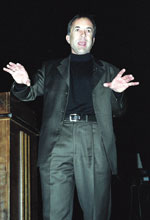Theist, skeptic debate existence of creator

Dr. Michael Shermer, Agnostic Nontheist
Opposing sides of the age-old debate on the existence of a divine being squared off April 21, on the campus of Missouri Southern.
The Campus Activities Board sponsored the “Existence of God Debate” between philosopher and theologian, Dr. Doug Geivett and publisher of Skeptic Magazine and founder of the Skeptics Society, Dr. Michael Shermer.
“We were pleased with the event,” said Jeremy Sturgell, lectures chair for CAB.
“Turn out was good from the campus and community, and both speakers were sought after by students with questions after the debate.”
Sturgell said more than 500 people attended the event.
“We received calls from Kansas City and Tulsa about when the debate was scheduled,” he said.
Geivett is a professor of philosophy and department chair in the Talbot School of Theology at Biola University, La Mirada, Calif.
He specializes in the areas of epistemology (the study of knowledge), philosophy of religion and philosophical theology.
His published books include Contemporary Perspectives on Religious Epistemology, Evil and the Evidence for God and In Defense of Miracles. He is a member of the Committee on the Status and Future of Philosophy for the American Philosophical Association, and a member of the executive committee of the Evangelical Philosophical Society. He has served as the minister to college students at churches in the Pacific Northwest and in Southern California.
Shermer is the host of the Skeptics Lecture Series at Caltech, and the co-host and producer of the 13-hour Fox Family series, “Exploring the Unknown.” His next book is The Borderlands of Science, about the fuzzy land between science and pseudoscience.
His book How We Believe: The Search for God in an Age of Science, presents his theory on the origins of religion and why people believe in God.
“We are not against religion,” Shermer said. “Rather, we believe in human intelligence, science and creativity.”
The average demographic for Shermer’s lecture series has changed over the years. What “used to be older white men, mainly retired scientists” has gained interest from a wider social group.
“Half the attendants for my lectures are hearing me speak for the first time,” he said. “Half are students, the other half are not, and there is a good mix of men, women, young and old.”
Geivett believes the best explanation for the creation of the world is that “God had something to do with it.”
“The creation of the world cries out for explanation, making it reasonable to believe in God,” he said. “Otherwise, if an infinite number of events must happen before a specific event can happen, then that event will never happen.”
“Not every event has a cause,” Shermer said. “Quantum events such as the radioactive decay of the beta particle do not have a cause, it just occurs.”
“I choose not to believe because there is no evidence,” Shermer said. “To me, the burden of proof is on the believer. You cannot prove a negative.”
Shermer and Geivett have debated more than six times.
“It never feels excessively rehearsed to me,” Geivett said. “I don’t work from a script, just an outline of points for my opening statement.”
During the debate, Shermer asked the audience if they believed in God. By show of hands, three quarters of the audience believed in a divine creator. When asked specifically about the God of the Bible, the count decreased to two thirds.
“I acted surprised, but I never am,” Shermer said later. “I ask that question often and generally get the same response.”
“This was a very cost effective event,” Sturgell said. “We paid $7,500 for the speakers and approximately 500 people attended. Divided out, that’s a reasonable $15 per person.”
Your donation will support the student journalists of Missouri Southern State University. Your contribution will allow us to purchase equipment and cover our annual website hosting costs.



























